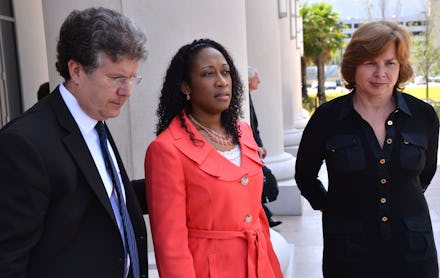Florida woman not allowed to claim “Stand Your Ground” against abusive husband is freed

Marissa Alexander, the Jacksonville, Florida, woman jailed in 2012 over a warning shot she fired to defend herself from an attack by her abusive husband, was freed from house arrest Friday.
According to the anti-violence initiative Survived and Punished, Alexander, a mother of three, has completed two years of court-ordered home confinement, after she served nearly three years in state prison on weapons and assault charges. In 2014, following an appeal of her conviction in a jury trial, Alexander accepted a plea deal to avoid a potential 60 years behind bars.
"We are grateful to God that this chapter of Marissa's life will come to a close on January 27, 2017," Alexander and her family said in a statement posted to Facebook. "We are sincerely thankful and appreciative to all who rallied, supported and prayed for Marissa's release."
Her case drew national notoriety in 2012 because of another case in Florida — the shooting and death of Trayvon Martin in Sanford, Florida — in which self-appointed neighborhood watchman George Zimmerman claimed self-defense as the reason he shot the unarmed black teen. Furthermore, activists say Alexander's case accentuated a persisting inequity for women of color who are disproportionately victims of domestic violence and who decide to fight back.
Zimmerman, who was acquitted in 2013 on second-degree murder and manslaughter charges, did not claim Florida's controversial "Stand Your Ground" self-defense law. But Alexander believed she had a legitimate reason to benefit from the law intended to shield self-defense shooters from criminal prosecution. Former state attorney Angela Corey, the same prosecutor who charged Zimmerman, said she didn't believe that Alexander meant to defend herself against her admittedly abusive estranged husband Rico Gray.
(In sworn statements, Gray acknowledged having physically abused Alexander. "I got five baby mamas and I put my hands on every last one of them except one," he said in one statement.)
Alexander testified that Gray had threatened to kill her on Aug. 1, 2010, moments before she fired her legally registered weapon into the ceiling of her Jacksonville home to prevent an attack. But Corey said Alexander should have simply fled the home, instead.
The details of the case sparked outrage among black activists and in the domestic violence prevention community. Alexander, a black woman without a criminal background, had given birth prematurely to a daughter days before the incident. As a result of her conviction in 2012, she was separated from her baby girl and jailed during the appeals process.
It was the Survived and Punished initiative, a collective of anti-violence organizations which took on advocacy around Alexander's case, that kept the case and the underlying issues in the spotlight. Approximately four in 10 black women and four in 10 American Indian or Alaska Native women have experienced rape, physical violence or stalking by an intimate partner in their lifetime, according to the 2010 National Intimate Partner and Sexual Violence Survey, a report of the Centers for Disease Control and Prevention.
When a battered woman is arrested for fight back against an intimate partner, it is typically because law enforcement failed to see the victim's action as self-defense, according to an advocacy guide by the National Center for Domestic and Sexual Violence.
"However, it is equally, if not more, common for battered women to be arrested and/or charged for using force [against their partner] in ways that are not necessarily criminal acts," Erin House, a legal advocacy coordinator for NCDSV, wrote in the guide. "This is where a thorough assessment is vital in making a determination of how to handle individual situations. The advocacy agency must get an accurate and complete picture of the incident and the power and control dynamics ... within the relationship."
Alexander and her family said they was determined not to let her experience happen to anyone else.
"As she enters a new chapter, with endless possibilities, we ask that you will continue to support Marissa through her non-profit organization that was established to end domestic violence and injustice in the criminal justice system, The Marissa Alexander Justice Project," the family said in the statement.
"Without you, today would not be possible," they said.